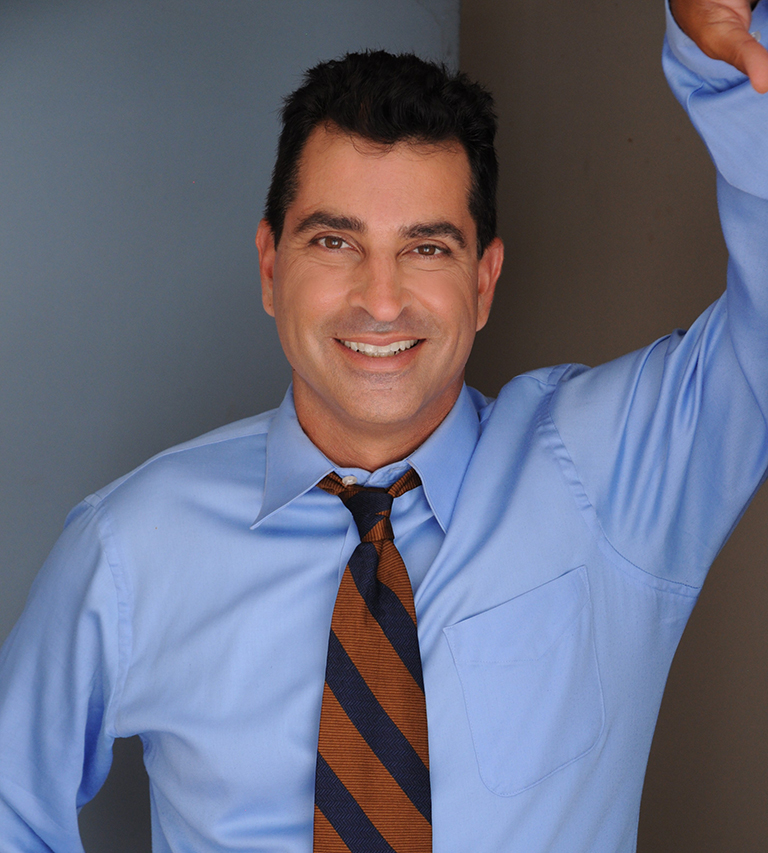It was the Tuesday morning right after the Little 500 weekend in the spring of 1992. It was a long night for me. I just did an open mike show at a dive bar called the Peanut Barrel on Walnut Street right across the street from the famous Bluebird. Not only was I on a natural high from the audience applause I received from last night's show, but I also was very hungover. Celebratory shots of Jack Daniels after my show last night didn't help the cause.
It was 9:28 a.m. and I was about to do a full sprint from the "tundra" near the business school to catch my 9:30 a.m. 300-level class with Tro Kortian on International Economics. Afterwards, I was scheduled to meet with Harriet Pfister to discuss my plans after graduation.
Class ended and I said to myself, "I am definitely not ready for finals week. I have a show in Indianapolis Tuesday night and our final is on Wednesday morning! How am I going to pull this off? I wish I were a magician instead of a comic!"
I went upstairs to Harriet's office in Ballantine Hall. She greeted me with her classy, super polite Midwest HELLO that you rarely hear anymore these days. We sat down and she asked, "So what are your plans after graduation?" I said, "I want to be a stand-up comic." Her jaw just dropped. To fill in the awkward silence I added, "I am planning on finishing my Econ degree but going an extra year for my Theatre degree." She sat back in her chair, fiddled with her glasses and said, "Good for you! I have an idea! We have our annual Econ party coming up this weekend. Can you perform for us?" I took a big sigh of relief and said, "Absolutely."
The annual Econ party used to be FUN! I did my set and got some laughs but back then it was an open mike. Grad students would come onstage and impersonate their favorite professors and for a bunch of stereotypical "nerdy geeks" it was a blast!
Most people after an Econ degree go on to work on Wall Street, CBO office in DC, or a super fancy bank. My first gigs were dive bars, comedy clubs in Chicago and Milwaukee in the 90s and then to Hollywood in the 2000s. I had some success in Hollywood, but my true calling was golf with my Evans Scholar background. I now perform my 45-minute customized golf act at country clubs across the country. See my profile on CountryClubComic.com for details.
Everyone in Hollywood always asks me, "What did you learn from your Econ degree?"
Three things:
- Budgeting my money. In Hollywood I saw so many of my fellow comedians and actors blow all their money after a big payday on a TV show or national commercial.
- Opportunity costs. Do I do a show in nearby San Diego, or do I travel to Ohio for the same price?
- Setting up my business as the Country Club Comic. How much capital do I need? Who is my competition? Try applying Bayes Theorem to these questions and your mind will really start spinning!
It is called "show business" for a reason. A lot of artists I know forget about the business part which was instilled in me with my degree in Econ.
The Econ department in my opinion is "more than meets the eye." On the outside you see statistics, mathematical theories, and the "nerd" in the front row with thick glasses. The "nerd" is equipped with a multi-colored BIC pen used to draw line graphs and aces every 300-level test. BUT on the inside that "nerd" was actually hilariously funny at the Econ party with his impressions of his favorite professors. Also, that nerd is probably a gazillionaire right now! LOL!
The 90s Econ department was FILLED with terrific and talented people like Harriet Pfister, Chris Cunningham, Steve Hackett, Tro Kortian, and your current chair, Michael Kaganovich. The above group really cared about their students before AND after graduation.
Sometimes before a show I get a little nervous and to calm myself I allow my mind to drift off to my days at IU. I think about the wonderful experiences I had. Before I go onstage, I ask myself, "How did this happen? I majored in Econ at IU, and I am doing stand-up?!?"
I guess Thomas Kuhn best describes me from an Econ perspective.
"Discovery commences with the awareness of anomaly, i.e. with the recognition that nature has somehow violated the paradigm-induced expectations that govern normal science."
In Econ terms I am an "anomaly." Amen brother …. I wouldn't want to take your 300-level class … unless I had a multi-colored BIC pen!

 The College of Arts
The College of Arts